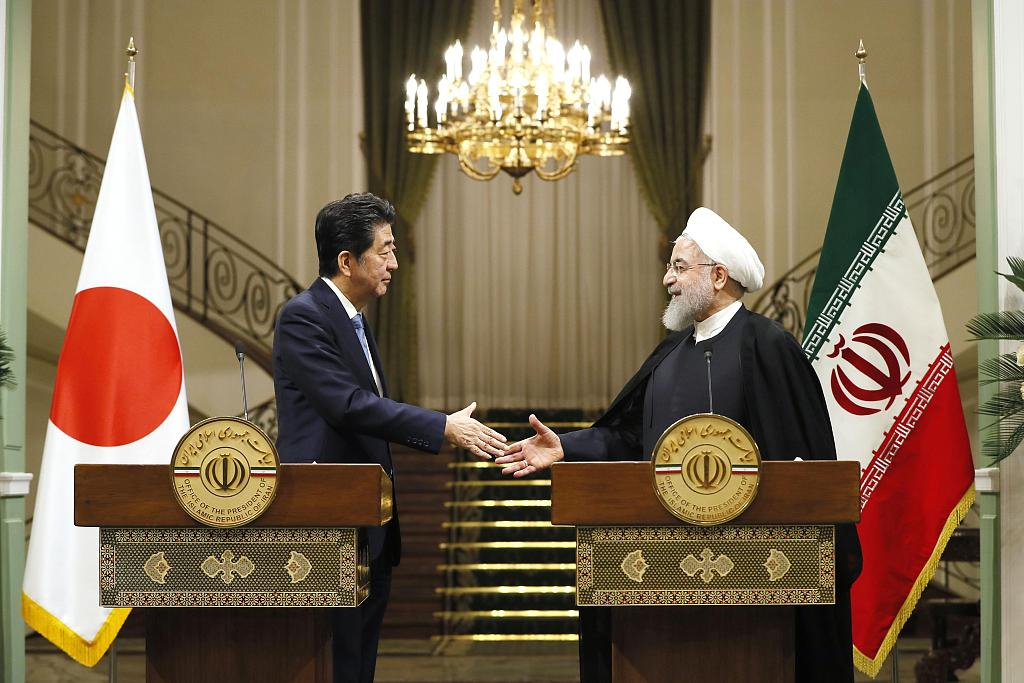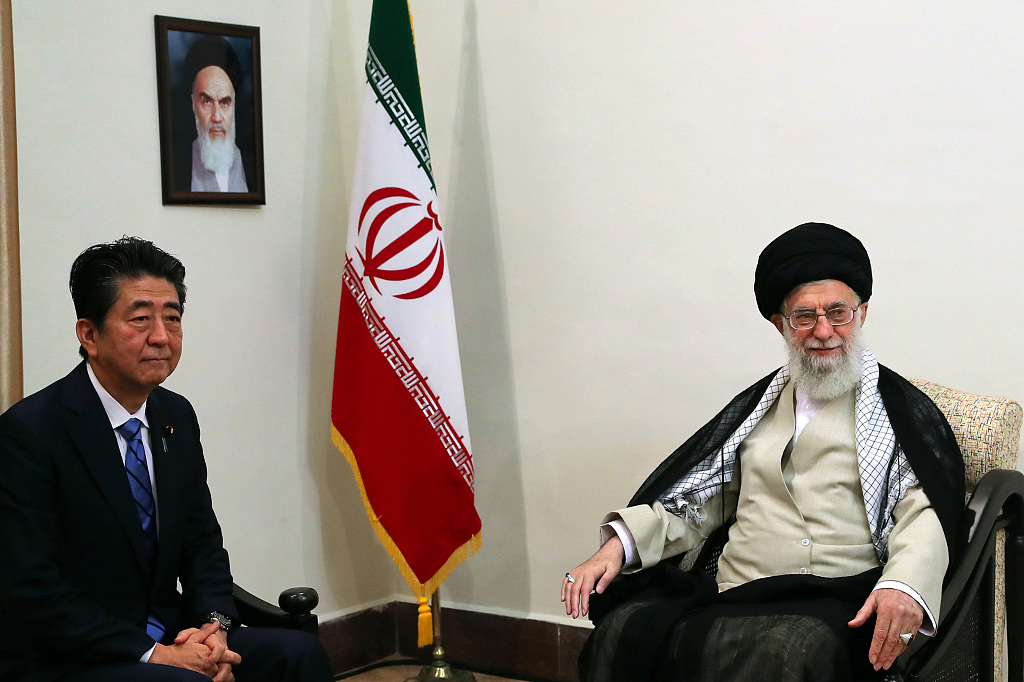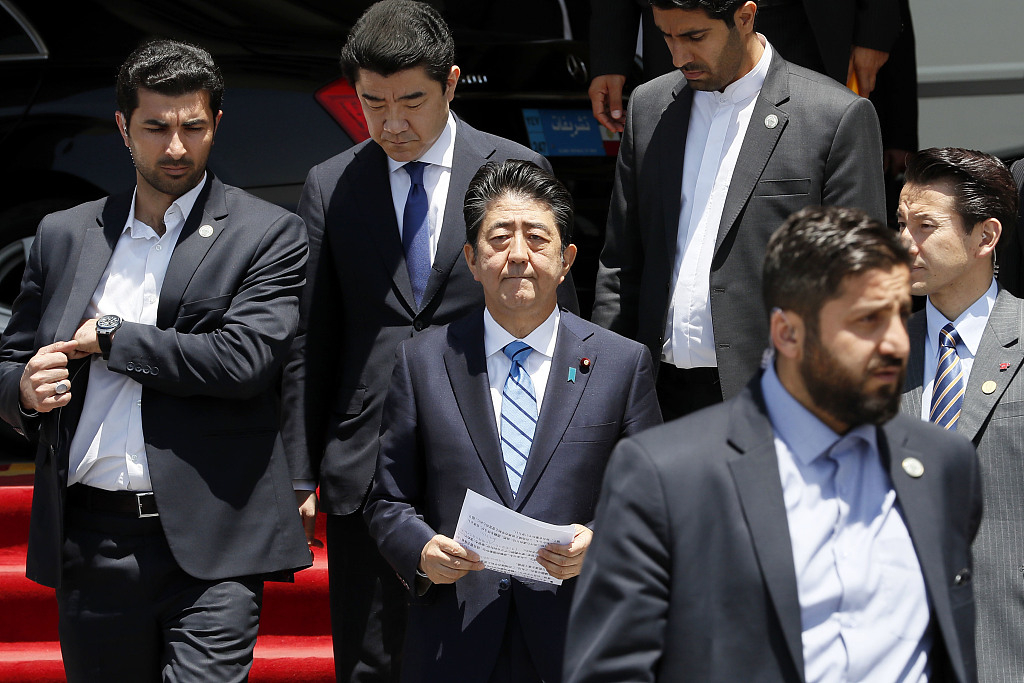

Editor's note: Guan Zhaoyu is an associate research fellow at the Chongyang Institute for Financial Studies of Renmin University of China. The article reflects the author's opinion and not necessarily the views of CGTN.
On June 12, Japanese Prime Minister Shinzo Abe arrived in Iran for a two-day visit. His visit has attracted worldwide attention, which aimed to reduce the tension between Iran and the U.S. During his visit, Abe met with Iran's supreme leader Ayatollah Ali Khamenei and its President Hassan Rouhani. He is the first incumbent Japanese Prime Minister who has visited Iran since Yasuo Fukuda in 1978.
After the U.S. withdrawal from the Iran nuclear deal last May, the Persian Gulf has been overshadowed with the possibility of a war.
Last month, U.S. President Donald Trump visited Japan and expressed his strong support for Abe's trip to Iran. At the same time, the international public opinion had high hopes for Abe, believing him to be practicing a "Bismarckian" diplomacy during his Iran trip.
In the past seven years, Abe played the role of an international "coordinator." He actively involved himself in the Korean Peninsula crisis, Russian-U.S. conflicts and cooperated closely with major European nations. This strategy is especially evident during the recent China-U.S. trade war: When Trump was visiting Japan, on the one hand, Abe tried to strengthen the Japan-U.S. alliance; on the other hand, he also encouraged China and the U.S. to return to the negotiating table.

A handout picture provided by the Iranian supreme leader office shows Iranian Supreme Leader Ayatollah Ali Khamenei during a meeting with Japanese Prime Minister Shinzo Abe in Tehran, June 13, 2019. /VCG Photo
Japan and Iran have historically had good relations and share a lot of common interests. That's why even when Iran was in isolation in the past, such as during the 1979 Iranian Revolution and the Iran-Iraq war (1980-1988), it did not cut off its ties with Japan. However, Japan remains an "outsider" both in the United States' strategy towards Iran and during the Iran nuclear crisis. Thus, it is not easy to have a "Japan Solution" to Iran's current crisis.
Nevertheless, for Abe, it was still a trip worth going. First of all, it would help to strengthen Abe and his party's positions in Japan's domestic politics. The country will hold its national Senate election this July, the results of which will undoubtedly have implications for Abe's continuous efforts to change the constitution. If the opposition parties formed a coalition, the chances are that they could break the two-thirds majority of the incumbent party. Otherwise, Abe will be able to accelerate the process of changing the constitution. By making achievements on the Iran issue, Abe could have a good image of himself among voters.
Economically, Japan's energy supply is highly dependent on imports from the Mideastern region. According to Japan's Ministry of Economy, Trade, and Industry (METI), in 2017, about 90 percent of Japan's oil imports came from the Mideast, of which 32 percent from Saudi Arabia, 27 percent from the UAE, and 15 percent from Iran. As the Trump administration didn't renew its waiver that would allow some countries, including Japan, to buy oil from Iran, Japan has stopped its oil imports from Iran since this May.

Japanese Prime Minister Shinzo Abe is pictured after meeting with Iran's Supreme Leader Ayatollah Ali Khamenei in Tehran, June 13, 2019. /VCG Photo
Moreover, Japan not only needs Iran's oil but also its growing vehicle market. According to the country's Automobile Industry Association, Iran produced more than 1 million vehicles in 2014, and this number is still fast growing.
However, despite Abe's visit, the Iran-U.S. conflicts will not end any time soon, and neither will the tensions in the Persian Gulf. Most countries realized that the direct military conflict between Iran and the U.S. would seriously damage global peace and security. At a time when unilateralism and hegemonism are growing, and the post-World War order is faced with possible changes, Abe's Iran trip is certainly much-needed positive action.
(If you want to contribute and have specific expertise, please contact us at opinions@cgtn.com.)

Copyright © 2018 CGTN. Beijing ICP prepared NO.16065310-3
Copyright © 2018 CGTN. Beijing ICP prepared NO.16065310-3